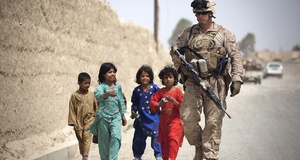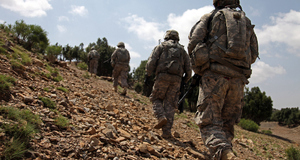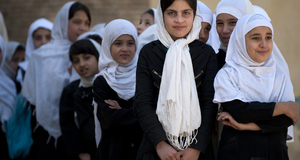From Interstate - Journal of International Affairs VOL. 2014/2015 NO. 1Britain's 4th Afghan War
By
Interstate - Journal of International Affairs 2015, Vol. 2014/2015 No. 1 | pg. 1/1
KEYWORDS:
British troops will be winding up their operations in Afghanistan by the end of next year. There may be other specialised things British troops will do thereafter, depending on what happens in Afghanistan from 2015. But sustained ‘combat operations’ for British forces have already ended and the 9,000 British troops in Helmand will begin pulling out from the beginning of 2014. By Christmas they should all be gone. They have been there in various ways since the autumn of 2001, so the country is winding down a commitment that has spanned a full 13 years. Many observers will be taking stock during the coming year and given the emotions that have been stirred during that time; few of the evaluations will be dispassionate. Strategic analyses are, by definition, long-term perspectives and as we go into this process of reflection a long-term view will certainly be needed. It is easy to be critical of British strategy in Afghanistan. So much was expected, so much has gone wrong. Critics keep referring to Afghanistan as a graveyard of British military ambitions going back to the days of Empire. In fact it was not. The British fought three wars in Afghanistan between 1839 and 1919 in which there were some spectacular reverses, like the massacre in the retreat from Kabul in 1842 or the battle of Maiwand in Helmand in 1880. But Britain won two of those wars and settled for an ambiguous result in a third. More to the point, the strategic objective of all Britain’s campaigns in Afghanistan was to keep Russia out of the north-west frontier of India. Whether this was a legitimate aim or not, the fact remains that it was a strategic objective and it was achieved. The current operation may go down as Britain’s Fourth Afghan War and we have to ask ourselves similar questions: with all that has gone wrong, all that could – and should – have been done differently; all that it has cost in human, materiel and moral currency, have the broad strategic objectives been achieved? The picture is not simple but it is important to understand the context in which early decisions were taken. Firstly, it began with a policy dilemma not a choice that could be freely made. The 9/11 attacks were planned and effectively launched from Afghanistan; Osama bin Laden had explicitly declared war on the West in 1998, and the Taliban government would not yield up a group that had committed the greatest terrorist act in history. The US faced a dilemma that it had either to acquiesce to the fact of the attack if it chose a negotiating strategy, or else intervene militarily in Afghanistan to restore – yes, restore – a sense of international justice. Britain faced a dilemma, too. Tony Blair was no less outraged by 9/11 than the US President and could choose to back up the US or else – in a moment when NATO invoked for the first time in its history Article 5 of the Washington Treaty – to shrink from the responsibility and indicate that the US was now less important an ally to Britain than it had been throughout the Kosovo crisis in 1999, the Bosnian crisis from 1992, the Iraqi no-fly zone from 1991 or the Iraqi invasion of Kuwait in 1990. It is barely conceivable that Britain would not continue to support the US in such egregious circumstances as the 9/11 attacks provoked. The question of what sort of support could be debated, but that Britain would try to make a tangible contribution to US action was virtually axiomatic, however unpalatable that action might become. Tony Blair certainly understood from the very beginning that involvement in Afghanistan would be neither simple nor brief. Secondly, once intervention in Afghanistan had removed the Taliban by December 2001, Western powers then faced a second dilemma. If a new government was to be established in Afghanistan, how far should Western powers go in supporting it? The choice was to withdraw quickly and leave Afghanistan to its future; quite possibly a sustainable future in a distinctive Afghan way, given that the Taliban were on their knees in 2002 and the country was generally optimistic. Alternatively, Western powers could remain significantly engaged to help establish a new type of Afghanistan and put it firmly on the road towards sustainable democracy and a better economy. Both possibilities were risky. In the event, Western powers fell slap between two clear alternatives and wilfully impaled themselves on the classic horns of the dilemma. They stayed engaged, but did little or nothing that made a difference. The invasion of Iraq in 2003 – a classic strategic blunder that was good for Iraqis, but bad for all other Western interests in the region – had the effect of neglecting Afghanistan. By 2006, the Western powers had not been in Afghanistan for five years, but rather for one year five times. The only thing that genuinely moved forward was the rotation schedules of the troops who shuttled through the country. In the five years that Afghanistan could have been made into an economic and political success, the disinterest of the international community was critical. The fact was that Iraq sucked all the strategic air out of Afghanistan in the policy-making offices of Washington, London, Brussels and Mons. Being neither politically out of Afghanistan, nor properly in it, US and ISAF forces made the situation worse in almost all respects. By 2005, the results were stark to those who considered the geopolitical aspects of the situation. If Afghanistan was left on the same trajectory, the strategy would undoubtedly fail and more than likely, the country would split apart isolating Kabul from Persian Herat in the west and from Pashtun Kandahar in the south-east. A Pashtun heartland spanning southern Afghanistan and the North West Frontier Province and Balochistan in Pakistan could become a political reality. The Durand line that demarcated Afghanistan from Pakistan would become meaningless (something that many Pashtun radicals have maintained for best part of a century); Jalalabad in Afghanistan and Peshawar in Pakistan would form a natural Pashtun homeland triangle with Kandahar in south east Afghanistan, and with the Baloch territories of Iran. Like the aspiration for a Kurdish homeland, an assertive people would straddle three (equally volatile) countries. If so, the crisis of South Asia would become a global flashpoint. In other words, Pakistan could not be stabilised by what happened in Afghanistan, but it could certainly be destabilised by it. Thirdly, in the face of this possibility, a plan was hatched during 2005 to reinvigorate the military contribution to Afghanistan, based on a deal between the Canadians, the British and the Dutch to take real strategic control of the south. The plan would only work if US troops came into Afghanistan in some numbers, but the US would only commit troops if the Europeans of ISAF were already there. Thus, to get the US back onto its own strategic track in Afghanistan, to save it from its own blundering distraction in Iraq, it was necessary to commit ourselves to the south. It was a neat enough analysis; at once an exercise in continuity to avoid failure and a leap into a new campaign to trigger something different and bigger. It was devised in the first instance by British, Canadian and Dutch military officers and their respective Service Chiefs. Politicians agreed with the analysis, civil servants worked through the details, and it was all floated through the North Atlantic Council in 2005 as a new NATO contribution to ISAF. It would take effect during 2006. There was no question of this plan being made in secret or being kept from the politicians. It is clear that everyone who should have known what was going on, did know and was appropriately consulted. Nevertheless, it is difficult to find over that winter of 2005-6, anywhere within this process, a strategic brain at work in Britain at a politically responsible level. There was no ‘strategic decision point’ that seemed to be recognised within either the government or the British military. The decision rested everywhere and nowhere. It was a fly-wheel on the dominant motor that drove the Iraq campaign during 2005-6, which was in some trouble during those months. The way we now judge Britain’s experience in Afghanistan flows from this crucial period of policy-making. Where did it leave Britain in its Afghanistan strategy? It worked insofar as it saved Afghanistan from immediate failure, united the US counter-terrorism operation with the nation-building mission of ISAF, and ultimately got US troops back into an operation they should have engaged with almost a decade previously. On the other hand, it put the Afghan operation onto a new strategic footing, at once stimulating an anti-foreigner insurgency, and combating it; raising the stakes even higher to become a matter of Western military credibility. For Britain, this created two crippling drawbacks. One was that Britain’s attempt to make a strategically significant contribution was frustrated by the fact that British troops went to Helmand and not to the real heart of the Pashtun and Taliban insurgency in Kandahar. If a powerful politico-military, well co-ordinated and muscular contribution to sophisticated nation-building was to be made anywhere to create national unity around Kabul, then it should have been in Kandahar. The other was the fact that Britain had no real influence over the country-wide strategy led by the Karzai government in Kabul. Where British counterinsurgency campaigns had been successful in the past, it was always where the high politics of government could be integrated with the low down and dirty process of keeping order and building stability on the ground. That did not exist in this case. And whether Afghanistan is a success in 2014-15 is now out of our hands. We can hope, but there is little more we can do to influence, still less control, the outcome. Successful counterinsurgency campaigns are not supposed to end with so much left to political chance. In the end, British troops will return in 2014 not with a victory, but a score draw away from home; a job reasonably well done in unpropitious circumstances. They might have done better in the 2006-7 campaigns but they have learned from the experience. For Britain as a whole, the country comes out of it rather in the way of the First Afghan War – an ambiguous result which has a reasonable chance of maintaining the strategic objectives. In this case it was to help prevent a worse crisis in South Asia, and to maintain the relationship with Washington in an era of great stress on America but very poor US leadership. It’s not a peace to be celebrated in Trafalgar Square. But nor is it dishonourable or a source of national humiliation. Professor Michael Clarke is the Director General of the Royal United Services Institute. Suggested Reading from Inquiries Journal
Inquiries Journal provides undergraduate and graduate students around the world a platform for the wide dissemination of academic work over a range of core disciplines. Representing the work of students from hundreds of institutions around the globe, Inquiries Journal's large database of academic articles is completely free. Learn more | Blog | Submit Latest in International Affairs |



















